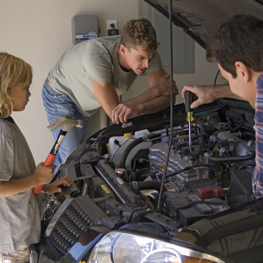
There have been a lot of opinions published online lately regarding the dad who shot his teen daughter’s laptop. In many ways, neither dad nor daughter was respectful toward the other. Good parenting involves mutual respect in a loving relationship. Mutual respect is treating another human being as no less and no more than one would like to be treated.
Respect transcends age, race, religion, culture and social status in importance in starting and keeping relationships. Good parenting also involves addressing the disrespect in a respectful way. Here are some don’ts and do’s that I have learned over my 22 years of parenting. They obviously work, because in raising a teen, preteen and three adult children, I have never had a door slam in my house yet!
DON'T:
• Call your child names or put down their ideas.
• Talk about them disapprovingly in front of other people.
• Make faces at your children, roll your eyes and mimic them or use words dripping with sarcasm. You are their leader and model for respectful behavior. As the adult, you must rise above immature responses.
• Use your child’s possessions, break them or give them away without your child’s permission.
• Go into your child’s room, computers, drawers, closets and snoop. Don’t allow their siblings and others to snoop either.
• Use sarcasm when addressing your child’s behavior such as, “I’m not your slave. Make your own lunch!”
• Punish your child, which includes everything from grounding, time-out, withdrawal of privileges, to hitting, fines and confiscating treasures.
• Yell, threaten, criticize, belittle or punish your children in public, especially in front of their peers.
• Tell them to, “Suck it up” or, “Be a big boy,” if they display any kind of feelings that you don’t like.
• Call in the forces and go in full frontal war mode when your child is disrespectful to you. Don’t engage in full power struggle and fight (punish) any way you can until you win. You may win the argument but lose your connection, communication, sharing and collaboration in the relationship.
• Turn away and let it go when your children are disrespectful. Call them on it by clearly explaining your expectations that everyone is treated with respect (and be sure you are modeling the same). Insist on restitution, apology, fixing the situation to make it better, or any steps you both think might help toward mending that relationship. Do request an expectation from your child that they will work toward change, when both of you are calmer. Set a time to talk.
• Ignore other people’s children when they are disrespectful to you and others in public. It takes a village to raise a child. Confront the child, and later their parent if there is no change, and insist on civility and politeness.
DO:
• Stay calm as much as you are able to. You need a calm frame of mind to deal with your child. Tell your child you are very angry and are going to take a short break if you need a few minutes to calm down.
• Confront with your I-statement. (“I feel unappreciated when I upgrade your computer and you don’t express thanks for my time and cost.”)
• Listen carefully to the response, and be truly open to what your child is feeling. Listening and validating their feelings doesn’t mean you have to agree with them. (“You seem to feel upset about the amount of chores you have to do around the house?”)
• Problem-solve the situation. (“Let’s go for a ‘walk and talk’ and see if we can find a solution that meets both our needs.”)
• Say, “Please,” “Thank you” or, “I-appreciate” to your child.
• Apologize when you make a parenting blunder.
• Look at backtalk as an opportunity to teach your child assertiveness with appropriate language skills.
• Treat others, especially people in service roles, with politeness and kindness when your children are watching.
• Treat your parenting partner with the same respect that you want. Don’t use name-calling, put-downs and sarcasm in your words. Do treat their treasures and accomplishments as items valuable and cherished.
In other words, promote respect, be a model of kindness and politeness and address learning situations respectfully with your children by problem-solving and that old standby, listening!
Judy is an international, award-winning, peaceful parenting speaker and bestselling author of Discipline Without Distress: 135 tools for raising caring, responsible children without time-out, spanking, punishment or bribery and the DVD, Plugged-In Parenting: Connecting with the Digital Generation for Health, Safety and Love. She is also author of the new book, The Last Word on Parenting Advice. For more information, contact 403-714-6766, email This email address is being protected from spambots. You need JavaScript enabled to view it. or visit www.professionalparenting.ca. Judy is also co-founder of Attachment Parenting Canada, 403-667-4557 or visit www.attachmentparenting.ca.
Calgary’s Child Magazine © 2024 Calgary’s Child